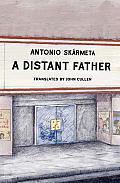A Distant Father, Other Press Again.
 Antonio Skarmeta’s A DISTANT FATHER
Antonio Skarmeta’s A DISTANT FATHER
Other Press again. This house just knows how to find stories people need to read, especially if it means they have to travel outside the U.S. to find them. I’m smitten.
Take A Distant Father. It’s tiny, easy to underestimate again. You almost have to call it a novella with it clocking in at about 100 palm-sized pages. Still, in such a short space, so much is said, so much pain and longing and emotion is felt.
The story revolves around Jacques, a Chilean schoolteacher in a small village. At 21, he’s hardly older than his students, hardly has any more life experience than the boys in his class. His days pass easily, automatically almost, like most people in their early twenties. Time is spent teaching literature, history and a couple other subjects Jacques does not like as much. As a second source of income, he works for a local paper translating stories and poetry into Spanish from the original French, the language of his father, a man who walked out on Jacques and his mother without warning.
Other than that, time is passed admiring the sisters of his student, two beautiful girls with a mysterious waywardness in their dress and attitude, the object of much speculation from the small town, and spending time with the town’s baker, a man that knew Jacques father maybe better than anyone else in the area.
It’s the simple question of the cost of a girl in the nearby city’s whorehouse asked by one of Jacques students that sets the story into motion. Immediately, Jacques replies it is not right for him to discuss such things with a student. In secret, he wonders himself. He’s never been to the whorehouse, maybe – although he never reveals it to us – he’s never even been with a woman before. And he wonders why not. And he plans his visit to the city of Angol, telling his mother and the rest of the curious in town that he’s going to the cinema, researching for a new translation he is working on.
Jacques finds his father in Angol, pushing a happy one-year-old boy in a stroller near the cinema house. Jacques and his mother had always imagined the man had gone back to France. Instead, he moved miles away, hiding himself in the dark projection rooms of the cinema, obtaining a new life and a new family.
Jacques does not express ill will towards the man. He thinks of his conversation with his father, the first one he has had in years, as similar to that of a friend. Still, the question as to why his father is there for that son, why he stayed with that mother and not with Jacques and his tears at the young man throughout the remainder of the novel.
I hate comparing books to other books with so much grandeur that when the new book doesn’t not become a classic or NY Times bestseller it looks like an inaccurate metaphor, but the only possible book for me to compare this to is Catcher in the Rye. It’s a boy – 21, not Holden Caulfield teen, yet a boy – growing up, dealing with his feelings of loneliness, going about his day in the best ways he knows how, just trying not to be too much of an asshole. More than that, though, A Distant Father zones in on the confusion of early adulthood, on the impossibility of knowing how to become a man when a role model was never there.





